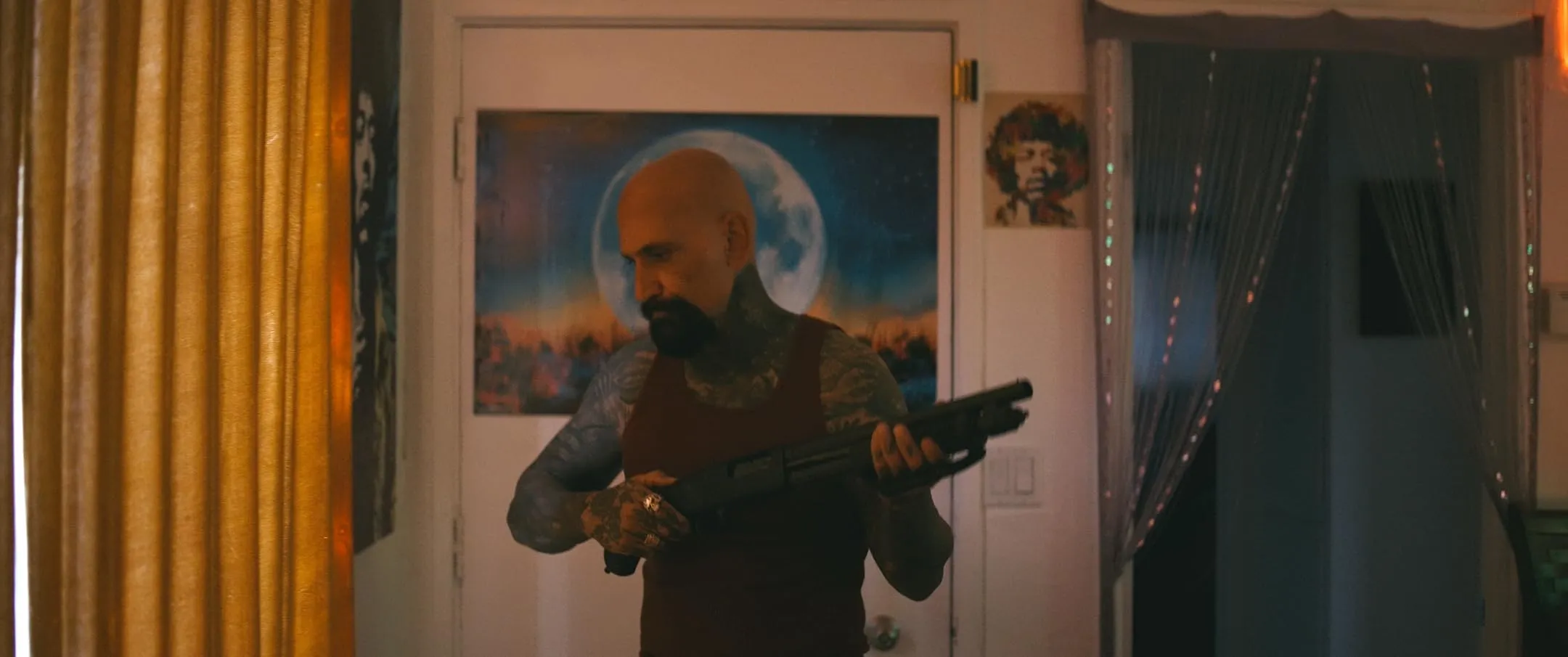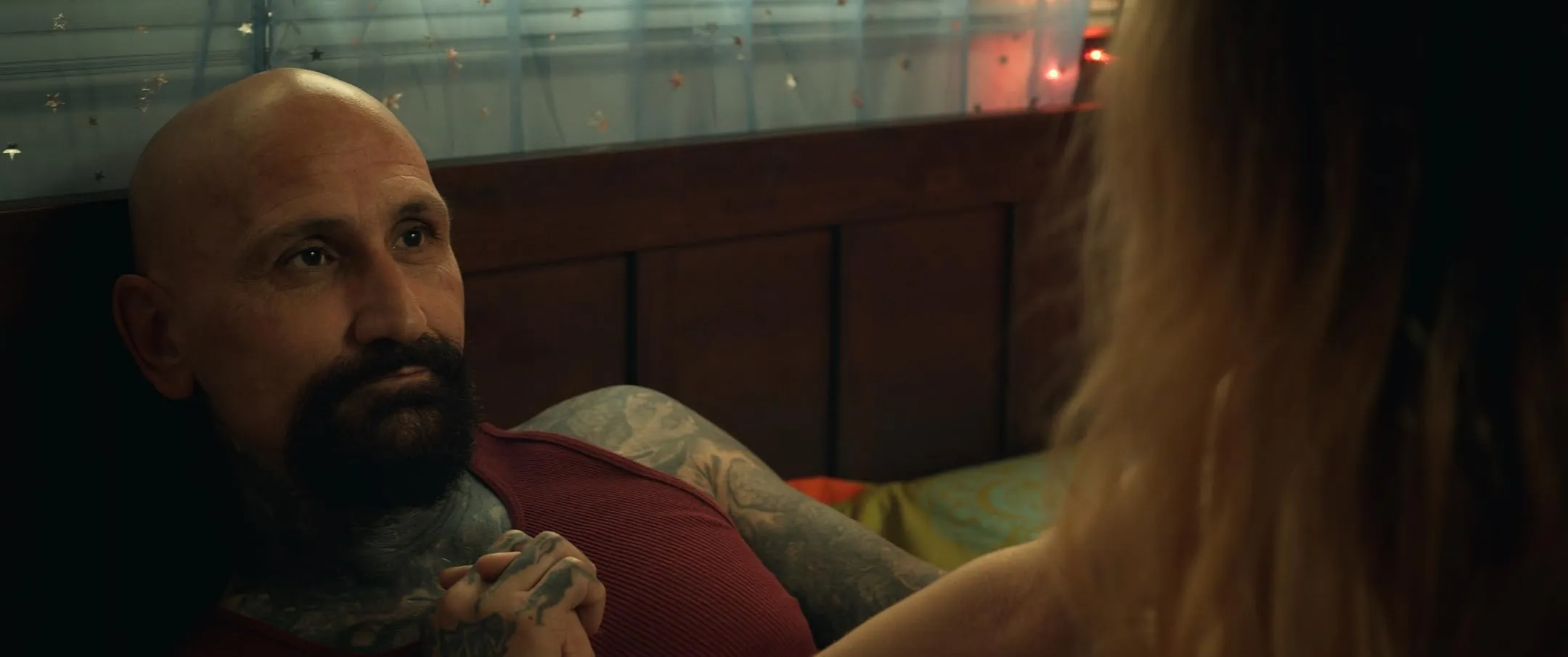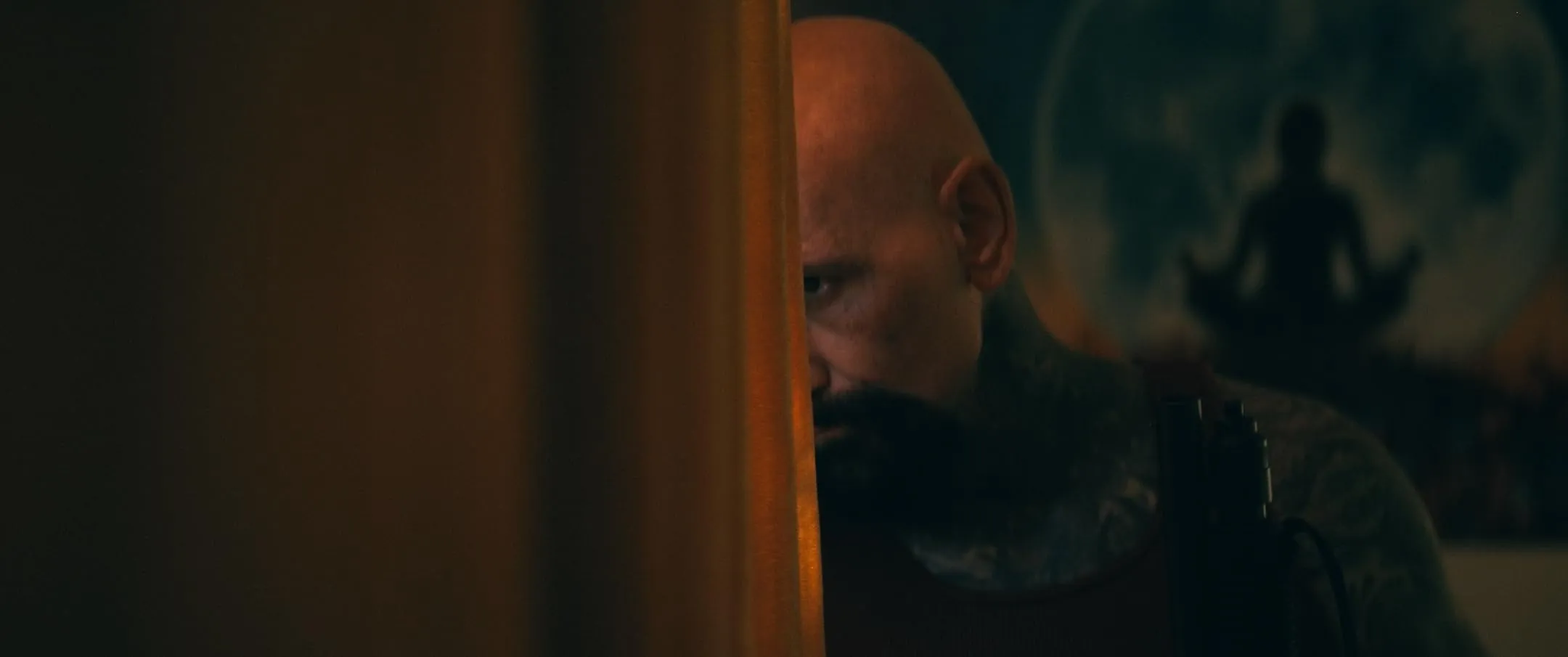“American Trash” stands out as a haunting look at pain, love, and the fragility of people in today’s gritty independent film scene. According to this intense story, Milles’s life takes an unexpected turn when he meets Melissa, an environmentalist with a free spirit who is also a war veteran dealing with PTSD.
With its setting in Venice, California, the movie is very personal for Robert LaSardo, who not only plays the lead role but also directs and co-writes the script. LaSardo gives the story a raw, unfiltered honesty that turns his artistic vision into a powerful movie experience that goes deep into the complicated mind of a wounded soldier looking for connection and meaning.
The story ties together ideas about caring for the environment, having mental health problems, and the terrible effects of an unexpected tragedy. “American Trash” gives a clear, unflinching look at how trauma can change people’s lives by following Milles’s journey through pain, short moments of hope, and emotional breakdown.
The movie is more than just a study of a few characters; it’s also a moving reflection on how people heal, how they lose, and how fragile our strength is. As an actor, writer, and director, LaSardo ensures that every frame is filled with real emotional depth, drawing viewers into a world where personal demons and social disconnect come together in terrible ways.
Broken Rhythms: A Journey Through Trauma and Loss
Through the lens of Milles, a war veteran dealing with the invisible scars of post-traumatic stress disorder, “American Trash” tells a deeply personal story set in Venice, California. When he meets Melissa, an enthused environmentalist with a contagious love of life, something surprising happens—a connection that temporarily lifts the heavy shadows following him.
Their relationship grows as they work together to protect the environment, have deep talks, and understand each other in a way that goes beyond most romantic relationships. Milles finds comfort in clearing up wooded areas and caring for an old cave that holds meaning. He sees in Melissa a sign of hope and a possibility for healing. Her free spirit and real compassion start to break down the emotional armour he’s built around his traumatized mind.
However, the fragile peace is brutally broken when two random villains kill Melissa in an instant and violent way. This action sends Milles into an unimaginable depth of grief and anger. The disaster tears away the thin veneer of stability he had worked hard to keep up, starting a terrible fall into darkness.
Milles tries to deal with his stress by talking to his therapist, Melissa’s sister, Mandy, and the police in his area. He is desperate for answers and feels like everything is unfair. Each conversation turns into a battleground where his broken mental state is shown to be, showing how deeply his time in the service and this terrible loss have affected him.
The story doesn’t offer an easy way to be forgiven or healed. On the contrary, it paints an honest picture of a man whose hope is slowly destroyed by a world that doesn’t care about his pain. Milles’s trip turns into a heartbreaking look at how trauma can spread and turn grief into a destructive force that threatens to consume everything in its way.
In the end, “American Trash” is a difficult reflection on how strong people are, their mental health, and the very thin line between surviving and completely losing their minds.
Fractured Souls: Navigating Human Complexity
Robert LaSardo gives Milles, a war veteran whose mind is full of suffering and unresolved pain, a performance that changes the viewer. Milles is more than just a character; he is a raw look at how being in the service can break people’s spirits. Picking up trash in the woods daily isn’t just an act of environmental action for him; it’s a desperate attempt to bring order to a world that feels utterly disorganized.
Milles’ PTSD isn’t just a label; it’s a real, live thing that affects everything she does and says. He seems filled with a heavy sadness that you can almost touch, a strain that is always there and could break at any time. When Melissa comes into his life, he changes slightly, but not completely. There’s a hint of healing that could happen.
Melissa, played by Lorelei Linklater, is more than just a love interest; she’s a symbol of hope and renewal. She is an independent environmentalist interested in Charles Manson’s ideas. She adds a lot of complexity to Milles’s organized life. Milles finds comfort in her way of life, which is deeply connected to caring for the earth and the potential of people. This gives him a short break from his problems.
The supporting characters are kind and thoughtful as they follow Milles on her trip. His therapist, Tai, is always there for him and doesn’t judge him. He has an almost zen-like personality. Melissa’s sister, Mandy, takes on her sister’s love of the environment to honour her and try to connect with Milles even though he is slowly pulling away.
Detective Anderson is a good example of institutional truth because he knows how complicated justice can be without losing sight of people. He walks the tricky line between following the rules and caring about others. He knows that solving a murder isn’t just about getting the killers; it’s also about understanding their pain.
Each character in “American Trash” is more than just a plot device; they’re also a carefully thought-out way to look at trauma, connection, and how fragile our ability to bounce back from bad things is. They make us question what we think we know about healing by showing that it’s not always a straight line and is often a mess.
Echoes of Pain: Navigating Human Complexity
When it comes to mental health, “American Trash” is brutally honest. It turns PTSD from a label into a real-life experience. Milles’ journey isn’t just a simple story of healing; it’s also a raw look at how tragedy changes how people see things. His problems show up in his complicated mental landscapes as hallucinations, anxiety, and a strong feeling of being disconnected from everything that he does.
The movie doesn’t try to make mental health problems seem more appealing. Instead, it shows PTSD as a complicated and often overwhelming force that doesn’t go away with good goals or short-term connections. Milles’ ways of dealing with stress, like picking up trash in the woods, are like metaphorical attempts to bring order to a world that feels truly random and chaotic.
Environmentalism isn’t just background noise in the movie; it’s a deep metaphor for fixing ourselves and each other. Melissa is very dedicated to cleaning up places, both real and imagined. This shows a deeper human desire to repair and protect. Picking up trash repeatedly becomes a strong symbol of recovering hope and finding meaning in things that don’t seem important at first.
The movie’s look at loss goes beyond the usual limits of a story. Melissa’s quick and violent death is more than just a plot point; it’s a seismic event that changes Milles’ whole view of life. Grief is not a straight line; it’s a volatile, uncertain force that can destroy and possibly rebuild human experience simultaneously.
Because it doesn’t offer simple answers, “American Trash” forces viewers to be uncomfortable and understand that healing isn’t always easy and often involves facing the most painful parts of life.
In the end, the movie makes the point that our deepest hurts can be the worst things that happen to us and the best way to learn about ourselves and the world around us.
Crafting Emotional Landscapes: Storytelling Unveiled
Through his many-faceted method, Robert LaSardo turns “American Trash” from a simple story into an intensely emotional experience. By writing, directing, and acting in the movie simultaneously, LaSardo achieves a level of authenticity that has never been seen before. It feels less like a performance and more like pure emotional archaeology.
His directing style doesn’t follow the usual Hollywood polishing rules. Instead, it embraces a raw, unfiltered look that matches Milles’ mental landscape. Each frame seems to have been carefully put together to show how unstable the character is. The visual compositions communicate more through small movements and moments that aren’t said than through direct speech.
The script is very restrained, letting the characters’ psychological depth come out through carefully tuned interactions. Conversations aren’t just dialogues; they’re deep psychological probes that show layers of pain, hope, and vulnerability.
The conversations between Milles and Melissa are especially interesting because they mix environmental philosophy, personal trauma, and unexpected cultural references, like their interest in Charles Manson’s recordings. This creates a unique narrative texture that goes against what most stories are supposed to be like.
Instead of comforting the story, LaSardo’s script shows emotional truth as messy, unpredictable, and fundamentally human. By not telling healing stories in a straight line, the script turns into a deep reflection on life, connection, and the complicated ways people can bounce back from hard times.
Raw Emotions: Performance as Storytelling
Robert LaSardo makes Milles more than just a character; he makes him a real, breathing example of how complicated trauma is. His performance is a masterclass in controlled intensity, and you can feel his vulnerability through his tiny facial reactions and body language. LaSardo doesn’t just play; he digs up people’s pain with surgical precision.
In scenes where he picks up trash near the cave, which is a metaphor, LaSardo says a lot with little movement. His eyes tell whole stories of loss, confusion, and broken hopes. How he handles Milles’s complicated mind feels so real that it beautifully blurs the line between performance and real life.
Milles’ sadness is balanced by Linklater’s Melissa, who shines. Not only does she play a role, but she also represents a transformative energy that is both delicate and incredibly strong. Her performance shows a special mix of caring about the world and intuitive emotional intelligence.
LaSardo and Linklater have a connection that goes beyond standard romantic stories. Their link feels like a deep human recognition. Two hurt souls find temporary safety in each other’s company.
The supporting group, which includes Rich R. Rendon as Tai and Costas Mandylor as Detective Anderson, helps build up the characters’ feelings in various ways. Each actor or actress adds a lot to their parts, turning minor characters into important storylines that shed light on the complicated psychological landscape of “American Trash.”
Together, their performances make for a deep and multifaceted look at how people can bounce back from tragedy and how healing works.
Sensory Landscapes: Capturing Emotional Terrain
The photography of “American Trash” turns Venice, California, into a character—a broken-down cityscape that represents Milles’ mental state. Taking wide shots of trash-filled fields and lonely forests can be metaphors for how people feel inside. Each frame looks like it was carefully put together, and the muted colour schemes give the impression that the surroundings and the person are slowly falling apart.
The repeated theme of picking up trash becomes a strong visual metaphor, with each rejected item representing a chance to start over, similar to Milles’ journey of rebuilding her mind. Nature scenes aren’t just background but also players in the story, breathing with the same wounded energy as the characters.
The soundtrack becomes a scary character, and Charles Manson’s spoken word records become an unexpected plot point. These sounds aren’t just background noise; they’re psychological punctuation that creates unsettling soundscapes that add to the movie’s study of how broken human experience is.
Using background noise and carefully chosen musical moments, sound design becomes a subtle main character that communicates the inner rhythms of pain, hope, and possible healing. It’s amazing how silence can be as strong as sound, making emotional connections beyond normal story structures.
Fragments of Meaning: Decoding Silent Narratives
“American Trash” shows that picking up trash is more than just cleaning up the surroundings; it becomes a deep psychological ritual. Each thing Milles finds that has been thrown away is a physical attempt to bring order out of chaos, which is a reflection of his broken mind.
The organized process of collecting, sorting, and getting rid of trash cans can be seen as a trip of personal restoration, where healing isn’t about being perfect but about making small changes over time.
The strange connections to Charles Manson’s philosophical writings make the story more interesting. These events aren’t just shocking; they have deep psychological meanings that show the thin line between being left out of society and breaking down as a person. Manson is seen less as a historical person and more as a symbol of how systems don’t work right—a scary reminder of how trauma can change how people see and connect.
By weaving these unexpected philosophical lines together, the movie forces viewers to look at the complicated ways people can bounce back from hard times beyond typical stories of healing and hope.
The Review
American Trash
"American Trash" is not a movie that is easy to watch or has good endings. Instead, it gives a brutally honest look at grief, caring about the environment, and how people survive. Robert LaSardo's method as writer, director, and lead actor is multifaceted. He creates a raw, unflinching story without romanticising pain or offering simple healing methods. The strength of the movie is that it sticks to reality. It turns what could have been a normal psychological drama into a deep meditation on resilience by showing Milles's mental journey with a lot of subtlety. The performances, especially those by LaSardo and Linklater, take the story beyond the usual telling, making for a highly immersive experience long after the credits roll. The movie may be hard to watch because of its strong emotional scenes and unusual storytelling. Still, in the end, it tells a truly human story about finding meaning in broken pieces.
PROS
- Exceptional, nuanced performance by Robert LaSardo
- Profound exploration of PTSD and trauma
- Unique approach to environmental themes
- Powerful character development
- Innovative narrative structure
CONS
- Intense, potentially challenging narrative
- Non-linear storytelling might confuse some viewers
- Graphic depiction of trauma and loss






















































